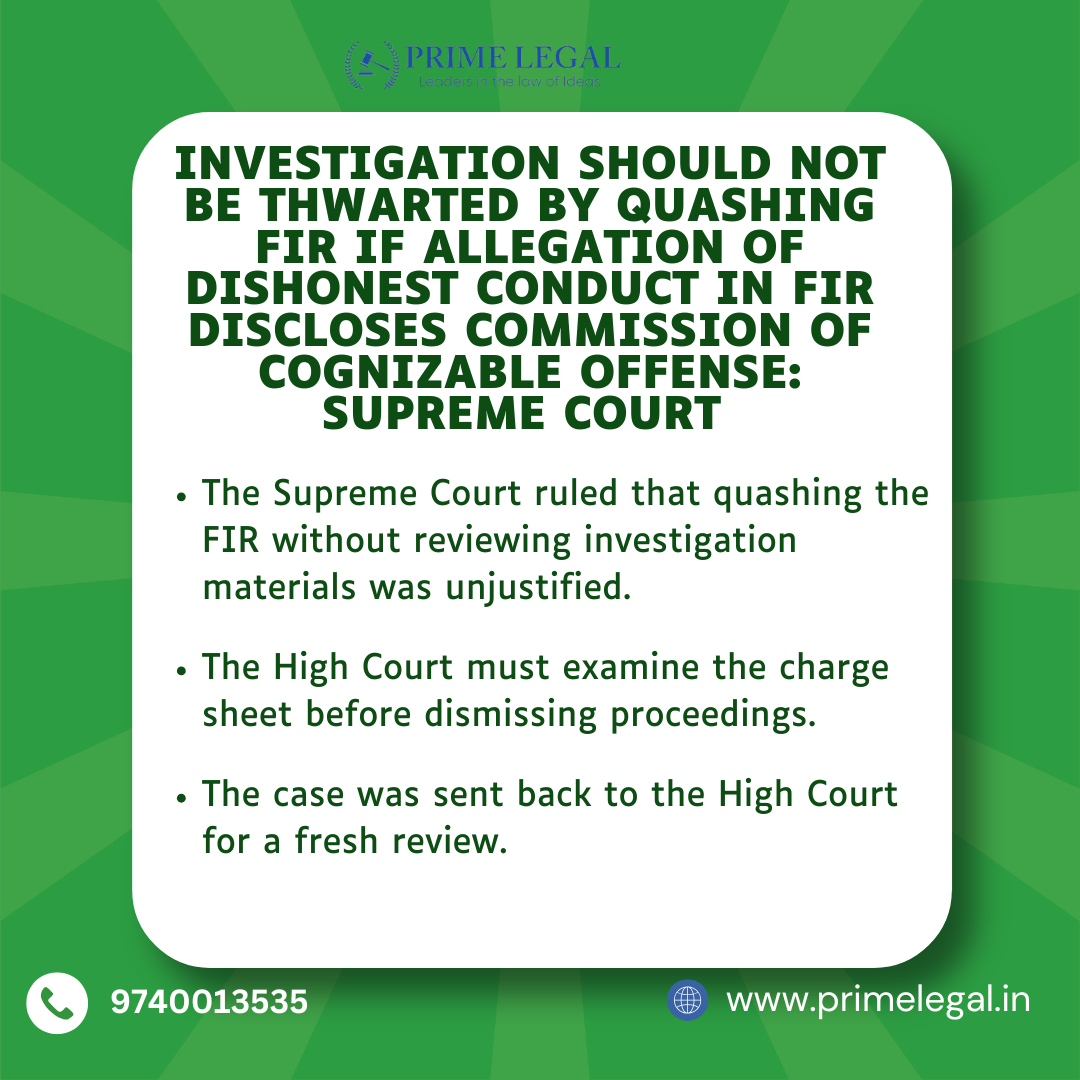CASE NAME- SOMJEET MALLICK vs. STATE OF JHARKHAND & ORS.
CASE NO.- SPECIAL LEAVE PETITION (CRIMINAL) NO. 6583 OF 2024
DATE OF JUDGMENT- 14TH OCTOBER, 2024
CORAM- JUSTICE J. B. PARDIWALA, JUSTICE MANOJ MISRA
FACTS OF THE CASE-
The appellant (original complainant) filed an application, under Section 156(3) Code of Criminal Procedure, alleging that the second and third respondents (original accused) offered to take appellant’s Truck (Trailor No.NL 01K 1250) on a monthly rent of Rs.33,000, exclusive of driver’s/helper’s salary, for plying it between Tata Steel Jamshedpur and Kalinganagar; pursuant to that offer, an agreement was entered into between the appellant and the accused on 10.07.2014 thereby letting the vehicle to the accused for a period up to 31.03.2016 with effect from 14.07.2014; and, in furtherance thereof, possession of the Truck was given to the accused. In return, they paid one month rent, after deducting TDS. But thereafter, though the Truck had been in possession of the accused since July 2014, 3 CJM rent including arrears amounting to Rs.12, 49,780 was not paid despite repeated false assurances.
In the application under Section 482 Code of Criminal Procedure it was, inter alia, alleged that no agreement was executed; that appellant intended to let out his Truck parked inside Tata Steel Factory, but, despite payment of advance rent of one month, necessary papers concerning the Truck were not provided, therefore, no agreement was executed; and even if it is taken that agreement was executed, no offence punishable under Sections 406 and 420 IPC is made out.
ISSUES OF THE CASE-
Whether the quashing of order of CJM, Jamshedpur, by the High Court of Jharkhand under section 482 of Code of Criminal Procedure was valid or not?
CONTENTIONS OF APPELLANT-
The Appellant contented that The FIR did disclose that after making payment of one month rent, no rent was paid despite false assurances. In such circumstances, a case for investigation was made out. Also, the appellant argued that the High Court did not consider the materials collected during investigation which resulted in filing of charge sheet. As charge sheet was submitted, the High Court ought to have considered the materials collected during investigation before concluding whether offence has been committed or not. Lastly, the argument made out by the Appellant was that The High Court failed to consider that whereabouts of the Truck was not known. Otherwise also, since the Truck was not returned, it could be taken that it has been misappropriated or disposed of by the accused in violation of the agreement, thereby disclosing commission of an offence of criminal breach of trust.
CONTENTIONS OF RESPONDENTS-ACCUSED –
On behalf of accused-respondent, it was submitted that the FIR did not disclose commission of any offence; therefore the High Court was justified in quashing the entire proceeding. The accused-respondents further contended that there was no specific allegation in the FIR regarding disposal or misappropriation of the Truck; hence no case of criminal breach of trust was made out. The offence of cheating is not made out in as much as dishonest intention from the very beginning is not disclosed by the averments in the FIR. Lastly, the accused-respondents submitted that the High Court was justified in quashing the cognizance order and further proceedings.
SUBMISSIONS ON BEHALF OF STATE-
On behalf of State, it was submitted through an affidavit that the original complainant had informed that as per agreement between the parties, the Truck/Trailor was rented to the accused for plying. However, Truck’s present location was neither known to the original complainant nor could be ascertained despite hectic efforts. \
CONCLUSION/ ANALYSIS-
The FIR is not an exhaustive list of accusations but should disclose the gravamen of the accusations to determine if a cognizable offense has been committed. The court is not required to identify the specific offense at this stage. If the FIR alleges dishonest conduct that, if supported by evidence, would indicate a cognizable offense, the investigation should not be halted by quashing the FIR. The specific offense for which the accused should be tried is determined after the investigation.
The petition to quash the FIR does not become irrelevant when a police report is submitted under Section 173(2) of the CrPC. However, in the absence of a stay on the investigation, the Court must carefully consider the materials submitted in support of the police report before deciding whether the FIR and consequential proceedings should be quashed. In the case at hand, the FIR alleges dishonest conduct by the accused regarding non-payment of rent for a truck, which implies retention of possession. Therefore, quashing the FIR without examining the materials collected during the investigation was not justified.
In our view, the High Court ought to have considered the materials collected during investigation before taking a call on the prayer for quashing the FIR, the cognizance order and the proceedings in pursuance thereof. The court requested the State to provide the charge-sheet for review, but it was not produced. The State’s affidavit mentioned that they were unable to locate the Truck/Trailor. Consequently, the court decided to remit the matter to the High Court for a fresh decision on the quashing petition after examining the materials collected during the investigation. Accordingly, the appeal is allowed. The impugned order of the High Court is set aside.
“PRIME LEGAL is a full-service law firm that has won a National Award and has more than 20 years of experience in an array of sectors and practice areas. Prime legal fall into a category of best law firm, best lawyer, best family lawyer, best divorce lawyer, best divorce law firm, best criminal lawyer, best criminal law firm, best consumer lawyer, best civil lawyer.”
Written by- ALOK G. CHHAPARWAL


